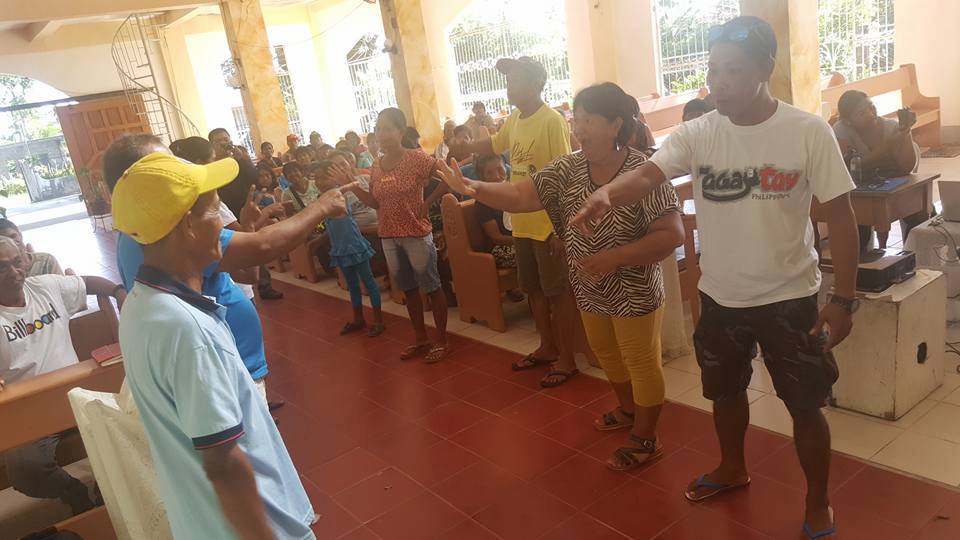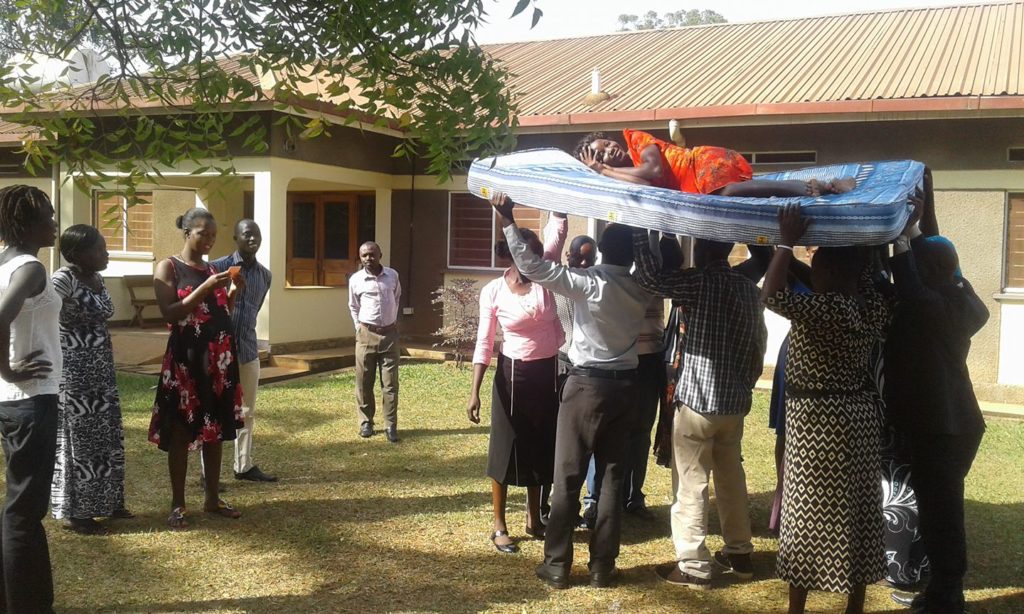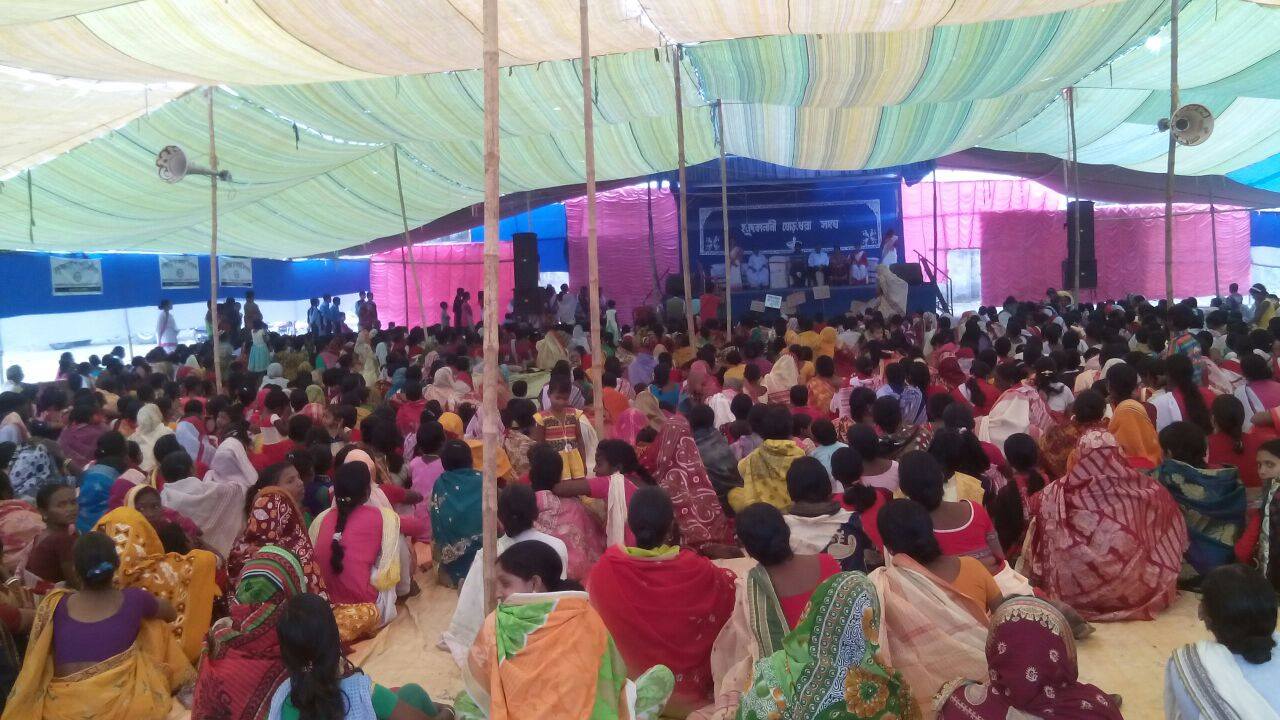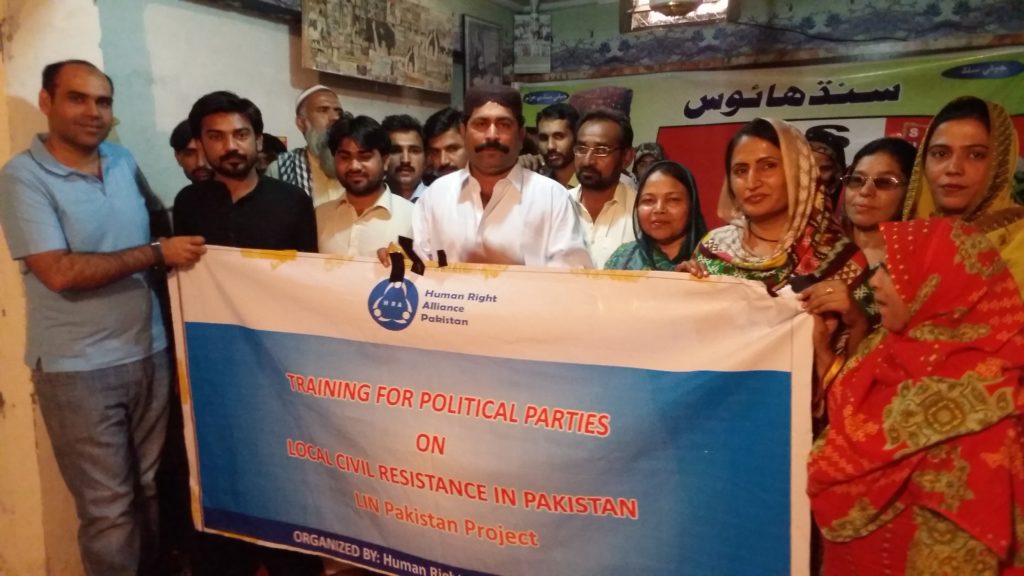Learning Initiatives Network
From 2014 to 2016, ICNC ran its Learning Initiative Network (LIN) program, which supported the work of individuals and teams who are strongly committed to learning and spreading knowledge about civil resistance in their communities.
From 2017 onward, ICNC shifted its focus away from accepting new LIN applicants and began administering small grants to LIN alumni through our Activist Education Program. In the future, ICNC may re-establish the LIN program and accept new applicants if we have the capacity to do so.
Alumni of ICNC programs (such as the ICNC Summer Institute for the Advanced Study of Nonviolent Conflict and the ICNC-Rutgers online course) were eligible to apply for LIN, which involved five phases:
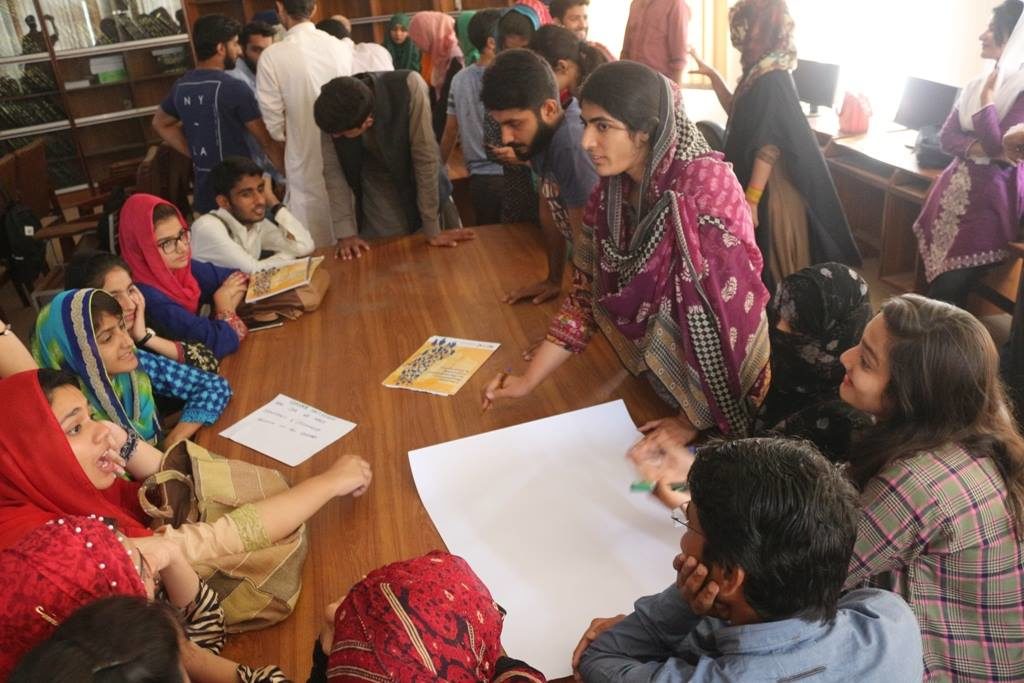
Participants complete an activity during a training on nonviolent strategy, tactical innovation, and gender issues in civil resistance, conducted by a 2016 LIN fellow.
1. Proposing an initiative to share civil resistance knowledge in the applicant’s community
Becoming a LIN fellow was a competitive process that involved a proposal to develop a local initiative (such as a series of workshops, the development of educational materials, translations, videos, and other products) to share civil resistance knowledge in the fellow’s community.
2. Sustained online/distance learning on civil resistance, and peer mentoring by other LIN fellows
Once accepted to the program, LIN fellows committed to a period of study of nonviolent civil resistance (through an online course designed and moderated by ICNC) and engagement with other fellows and experts on civil resistance. The bonds that formed among the LIN fellows during this time would often lead to ongoing exchange of ideas and advice throughout the program and beyond.
3. An in-person workshop attended by ICNC and all LIN fellows in a given year to prepare fellows to carry out their projects
After the online learning period, fellows would meet for an in-person working seminar to finalize their curriculum, critique each other’s projects, develop monitoring and evaluation plans, and receive personalized feedback from the ICNC team.
4. Project implementation
Based on this foundation, fellows would then launch their projects. Most projects included educational workshops, curriculum development, translation of educational materials, and the development of locally-based learning activities or educational resources adapted to their specific context and communities.
5. Reflection, reporting, and follow up
After implementing their projects, fellows would provide a report to ICNC detailing their activities, outputs, and observable outcomes, as well as monitoring and evaluation and lessons learned. During its three years, the LIN contributed to:
- The emergence of new campaigns for rights, freedom, and justice
- The strengthening of existing campaigns for rights, freedom, and justice
- Relationships and collaboration among other LIN fellows that could extend beyond the official LIN program
- The development of a strong network of coaches, trainers, and mentors in the field of nonviolent struggle who can support and educate each other and communities across the globe.
Results and Impact
From 2014-2016, LIN deepened the knowledge and skillsets of activists from 22 countries and supported these activists in developing workshops, training manuals, and translations on civil resistance in 20 languages that have directly impacted over 3,000 people and reached over 30,000.
- The 2014 LIN group included participants from Afghanistan, Armenia, Cameroon, South Africa, and Vanuatu. 11 workshops were conducted for over 330 participants, with an estimated broader reach of over 3,000 people.
- In 2015, LIN fellows were from eight countries: Armenia, Brazil, Burkina Faso, Cameroon, Ghana, Kyrgyzstan, Pakistan and Venezuela. Collectively, fellows held workshops and trainings that impacted over 850 people, with an estimated indirect reach of 8,500.
- In 2016, ICNC doubled the size of the LIN program, and awarded fellows from Cote d’Ivoire, Democratic Republic of Congo, Honduras, Hungary, India, Kenya, Madagascar, Mexico, Pakistan, the Philippines, Thailand, Uganda, and Zimbabwe. LIN 2016 directly reached over 2,000 people through the trainings, workshops, radio shows, community meetings, and events held by fellows, and indirectly reached a broader audience of up to 20,000 people in 13 countries.
Building on LIN’s Impact
In 2017, ICNC launched its competitive Activist Education Grants program in order to provide additional support and mentoring primarily to past LIN fellows. Activist Education Grants allowed LIN fellows and other alumni of ICNC programs to deepen or scale up their work.
Featured LIN Projects
Below we highlight some of the projects implemented by our LIN Fellows over the duration of the program from 2014-2016.
2016 LIN Projects
- Empowering Women in India
- Youth and Civil Resistance in Pakistan
- Social Lab of Nonviolence in Mexico
- Youth Activists in Goma, DRC
- Nonviolent Civil Resistance in the Philippines
- Strengthening Community Youth Leadership, Honduras
- Training civil society leaders in Côte d’Ivoire
- Community-led resistance in Zimbabwe
- Kenyans for Tax Justice Movement
- Nonviolent Actions in Madagascar
- Learning Initiative in Uganda
2015 LIN Projects
- Civil Resistance Training in Burkina Faso
- Shifting Brazil’s People’s Power to Act
- An Initiative for Change: Capacity building of youth, religion and political party leaders on local civil nonviolent movement in Pakistan
- Civil Resistance Seminar for University Students in Local Language, Kyrgyzstan
- Learning Initiative in Cameroon
2014 LIN Projects
- Introducing Nonviolent Civic Mobilization in Kunar, Afghanistan
- Theory, Power and Practice of Active Nonviolence in South Africa
- Mobilizing University Students to Choose Nonviolent Action in Cameroon
- Using Mobile Technology to Educate Students to Maintain Nonviolent Discipline
- Educating & Supporting Local Activists to Use Nonviolent Action in Vanuatu
2016 LIN Projects
Empowering Women in India
Transforming Women around Civil Resistance and Nonviolent Activism
Arnab Chakraborty, PRADAN, FSI 2016, LIN 2016
Arnab’s project focused on working with women in extreme poverty who face discrimination in their communities often resulting in neglect and abuse. These women feel powerless, each with a deeply limited sense of self-efficacy (self-worth and ability).
The project’s goal was to make change possible for women who individually feel powerless, who have not experienced a fair world, and to create such a world for themselves.
Two training of trainer workshops were organized for professionals from the nongovernmental organization PRADAN to introduce them to the concepts underpinning civil resistance and nonviolent movements.
This was followed by two training programmes for the community women to embolden them to occupy public space and assert themselves as equals in society and with various actors that have contributed to their present situation.
Forty-three women leaders participated in the training programme and have shared their learning with another 300 women. Numerous field visits led to the inclusion of another 800 women and their various movements and organizing efforts around issues such as stopping alcohol abuse resulting in physical violence and improvements and transparency in the various Government programmes. On March 8th, 2018 these women have organized a big rally gathering over 3,000 women.
As of today, these movements have started conveying great stories of change helping these women assert themselves as equals and take charge of their lives. The biggest change in these women is a mental transformation and belief that she counts, that she has agency (”Power within’’). She has also started believing and experiencing those poor women working together can create synergy, a very powerful social capital to create social and political space for them to change the distribution of power in society (“Power with”).
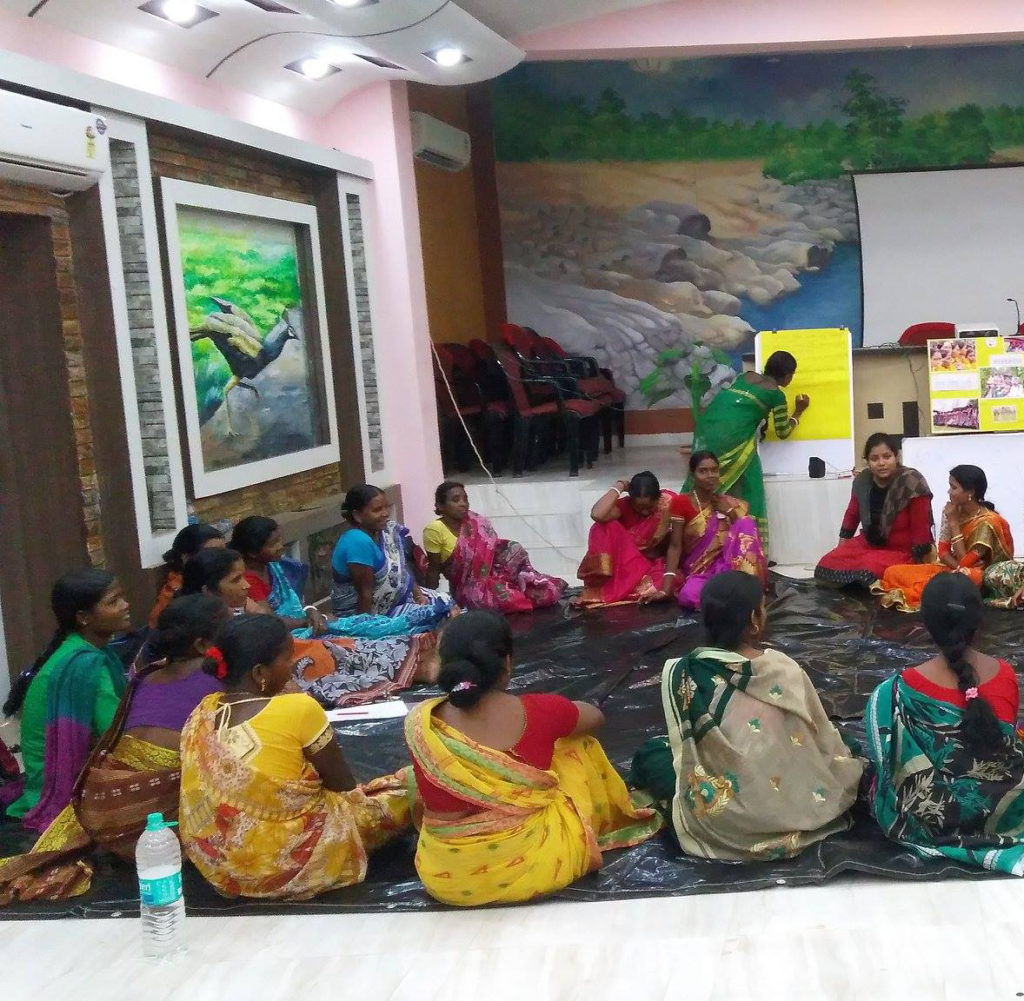
Youth and Civil Resistance in Pakistan
Learning Nonviolence for Participatory Citizenship and Democracy
Mariam Azeem, FSI 2013, LIN 2016
The “Learning Nonviolence for Participatory Citizenship and Democracy” project aimed to introduce nonviolent action and civil resistance as an effective tool to fight against oppression and hold duty bearers and the state accountable while demanding transparency in a democracy.
Mariam conducted a series of three-day workshops, using participatory techniques, equipping participants with skills applicable in their social work and activism dealing with corruption, oppression, and violation of human rights to bring desired change in their communities.
The project created a safe and inclusive space for youth (including sexual and gender minority groups) where they could acquire knowledge and skills related to nonviolent conflict and movement building. They learned about how they could engage in the democratic process and discovered tools and resources that can be used to demand their rights as citizens.
Through theories and historical examples, participants were able to understand the power of organized and nonviolent civic pressure, which can transform and shift the status quo. They learned exercises and simulations about how movements are managed while facing repression. This helped participants familiarize themselves with the importance of organizing people around a common vision to take strategic actions.
Following the workshops, a gender dialogue session was held to explore gender roles and spaces within movements and nonviolent civil resistance processes.
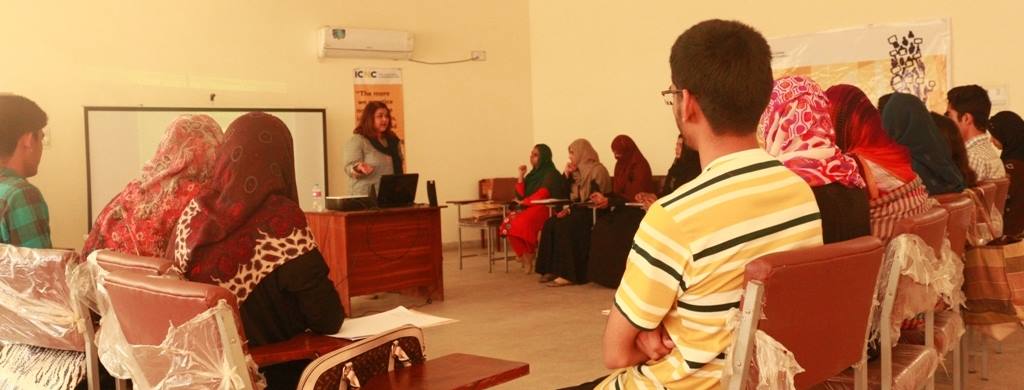
A handbook of reading materials and activities used during the workshop was distributed. Mariam also initiated the translation of articles on nonviolent civil resistance that has made the content more accessible in Pakistan. It will serve as a guide and reference on the subject of civil resistance in future endeavors.
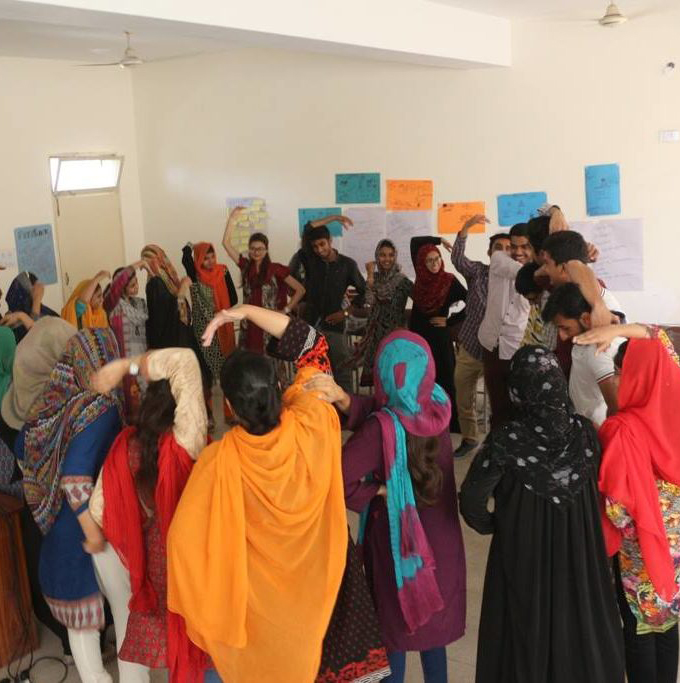
Social Lab of Nonviolence in Mexico
Social Lab of Nonviolence, Mexico
Alfonso Hernández, FSI 2016, LIN 2016
Alfonso launched the Laboratorio Social de la NoViolencia” project. It aims to spread knowledge on nonviolent conflict and civil resistance by producing educational materials and videos on these topics, and also creating networks among youth and grassroot organizations in different parts of México, especially in areas with high levels of violence. Five intensive workshops were conducted in 2016 for more than a hundred participants in Tijuana, Morelia, Cuernavaca, Juárez City and México City. Each session featured a toolkit with a workbook, anthologies of essential readings, three videos on nonviolent conflict and civil resistance, and a Trainer’s Manual as for future workshops.
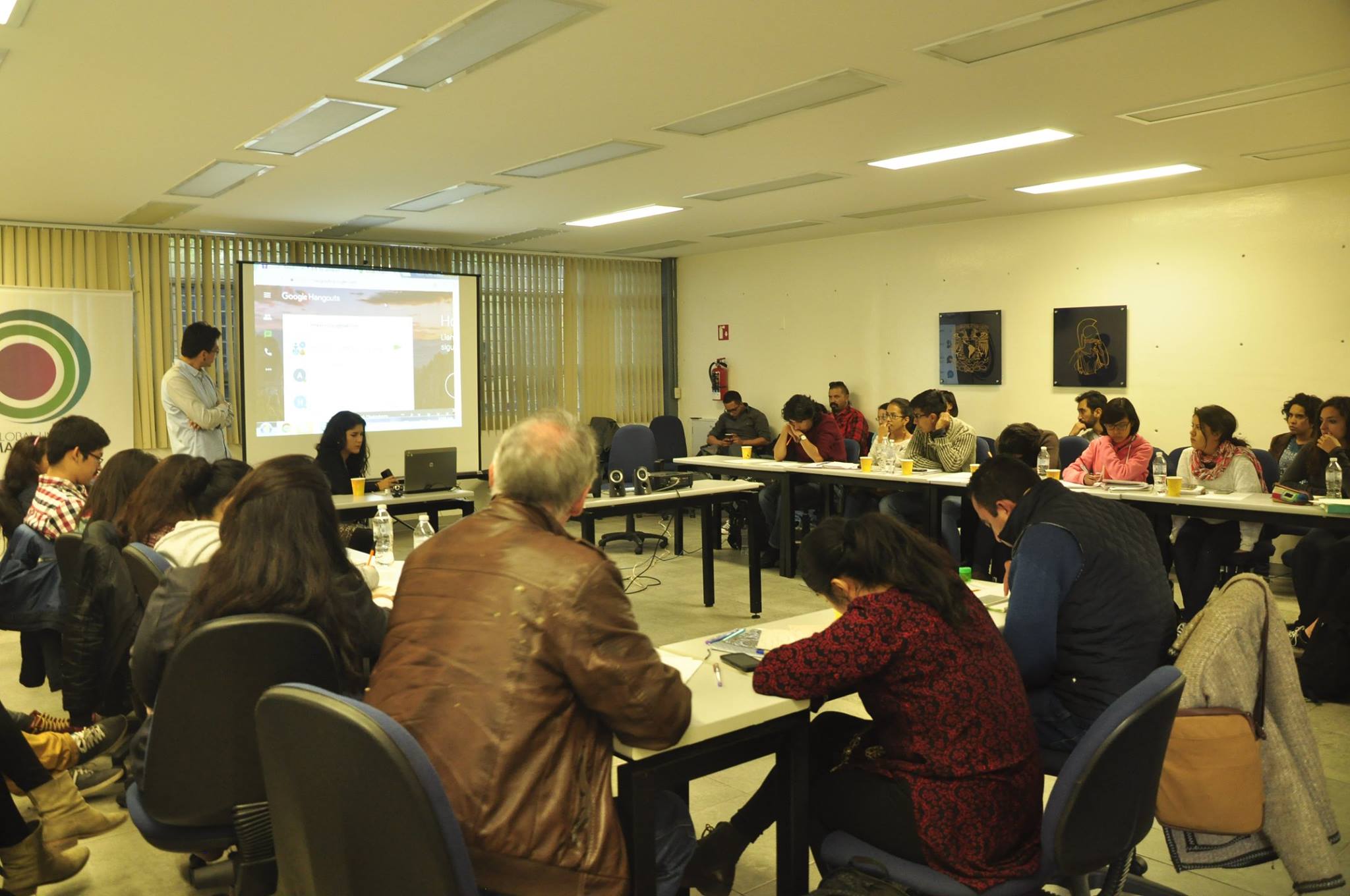 The first round of workshops saw the creation of a youth network with the goal of fostering continued learning and exchange about the theory and application of nonviolent conflict and the strategic aspects of civil disobedience. The Youth Peacebuilders Network has been active since, sharing the materials created by the Social Lab and organizing more workshops and activities with other youth organizations in México, especially in those communities who suffer from political and violent crime.
The first round of workshops saw the creation of a youth network with the goal of fostering continued learning and exchange about the theory and application of nonviolent conflict and the strategic aspects of civil disobedience. The Youth Peacebuilders Network has been active since, sharing the materials created by the Social Lab and organizing more workshops and activities with other youth organizations in México, especially in those communities who suffer from political and violent crime.
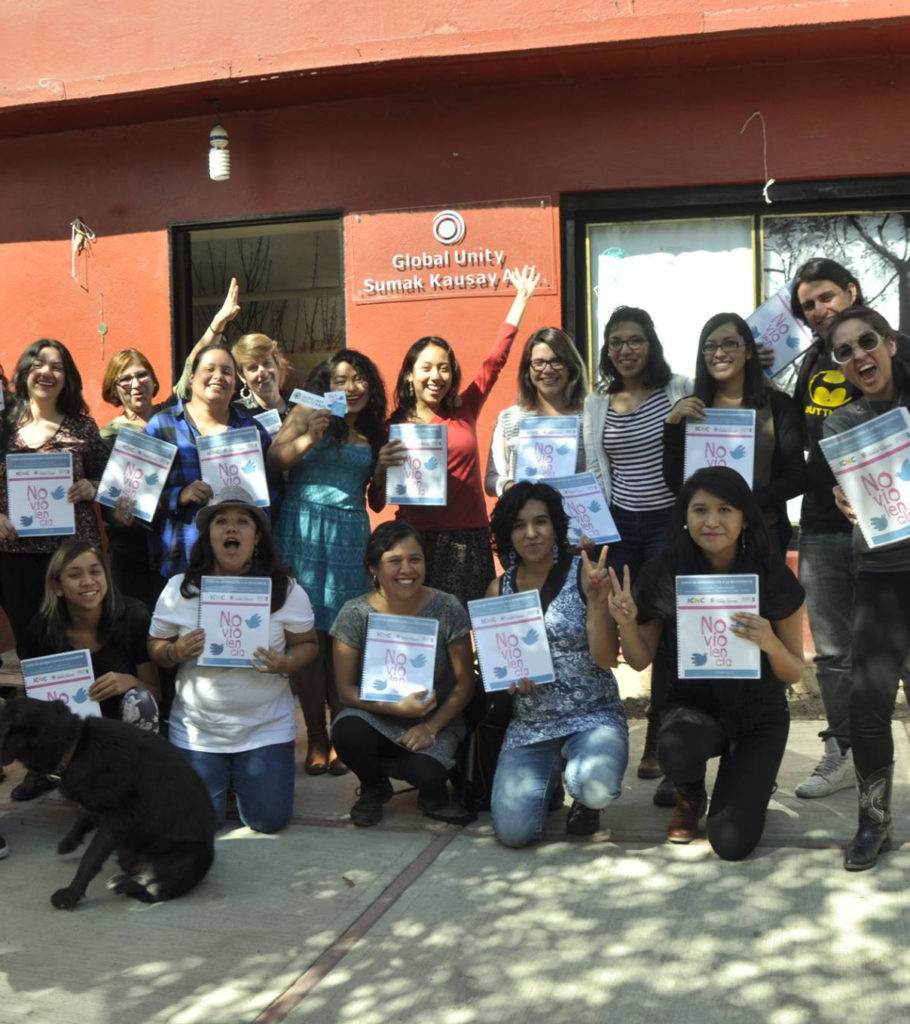
Youth Activists in Goma, DRC
Mobilizing youth and activists to employ nonviolent actions in Goma, DRC
Jean de Dieu Alingwi, ICNC-SI 2016, LIN 2016
Jean de Dieu’s project introduced concepts and case studies of nonviolent action to workshop participants in Goma, the capital of North Kivu province in the Democratic Republic of Congo. One three-day workshop was conducted for 28 participants that included human rights activists, journalists, cartoonists, comedians, poets and writers, singers and filmmakers, bloggers and caricaturists from the city of Goma.
‘Nonviolent Clubs’ made up of talented youth and activists were created to operate with dual functions: 1) increase public awareness and knowledge sharing about nonviolent action and nonviolent discipline, strategic planning, movement sustainability and social media tools; 2) develop and foster a network of citizens who will monitor local issues of repression and corruption, chart possible responsive actions to share with relevant institutions, and coordinate civil resistance and advocacy activities.
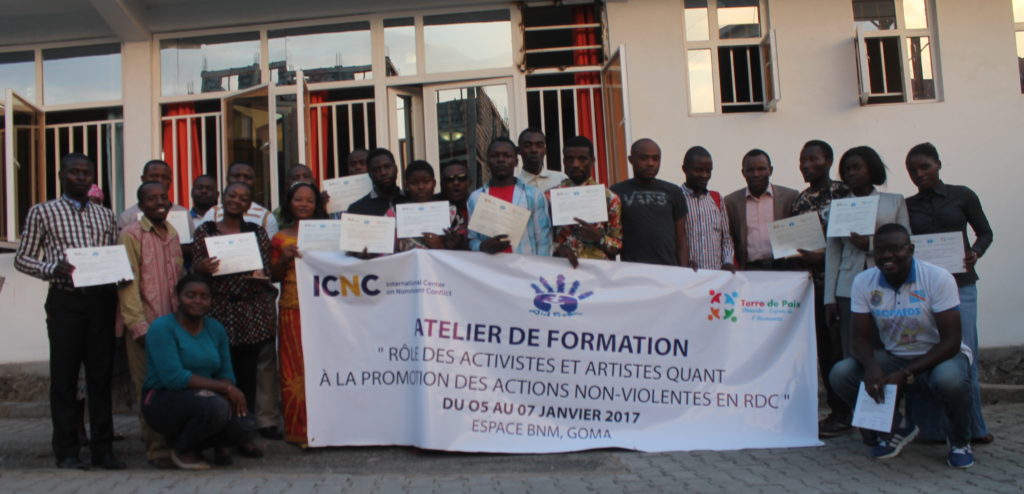
A handbook on civil resistance in French was developed. The handbook includes general concepts on the topic and cases of historical and existing civil resistance and nonviolent actions relevant to the DRC.
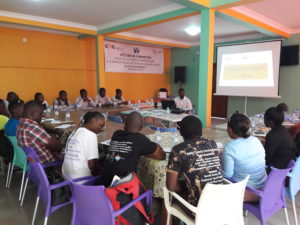
Nonviolent Civil Resistance in the Philippines
Civil resistance and strategy development in the Philippines
Xavier Alpasa, ICNC-SI 2016, LIN 2016
Xavier’s project aimed to strengthen the civil resistance capacity of the Taskforce Anti-APECO (TFAA), a national coalition of farmers, fisherfolk, indigenous people, civil society organizations, lawyers and youth who are campaigning against development aggression, land grabbing, and other human rights violations in the town of Casiguran, Philippines. TFAA works to challenge and repeal the Aurora Pacific Economic Zone (APECO), which has been adversely affecting local populations. Two trainings in nonviolent civil resistance were conducted in Casiguran with 229 locals participating. The project produced a comprehensive and long-term campaign strategy and communication plan for future movement mobilizations against APECO.
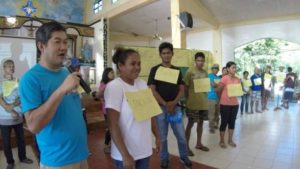
Strengthening Community Youth Leadership, Honduras
Civil resistance training for Afro-Honduran communities
Edwin Alvarez, ICNC-SI 2016, LIN 2016
One three-day workshop was conducted for 89 Afro-Honduran youth (54 women, 35 men) from 30 Afro-Honduran communities. The workshop covered multiple topics on nonviolent civil resistance, as well as intersecting issues facing participants’ communities, such as migration, climate change, and women’s participation in movements. Edwin estimates that the workshop indirectly benefited 445 people via participants’ extended families. Media presence and reporting at the workshop led to a degree of national exposure. A manual on nonviolent organized civil resistance was created in Spanish, and several presentations and curriculum materials were translated into Spanish.
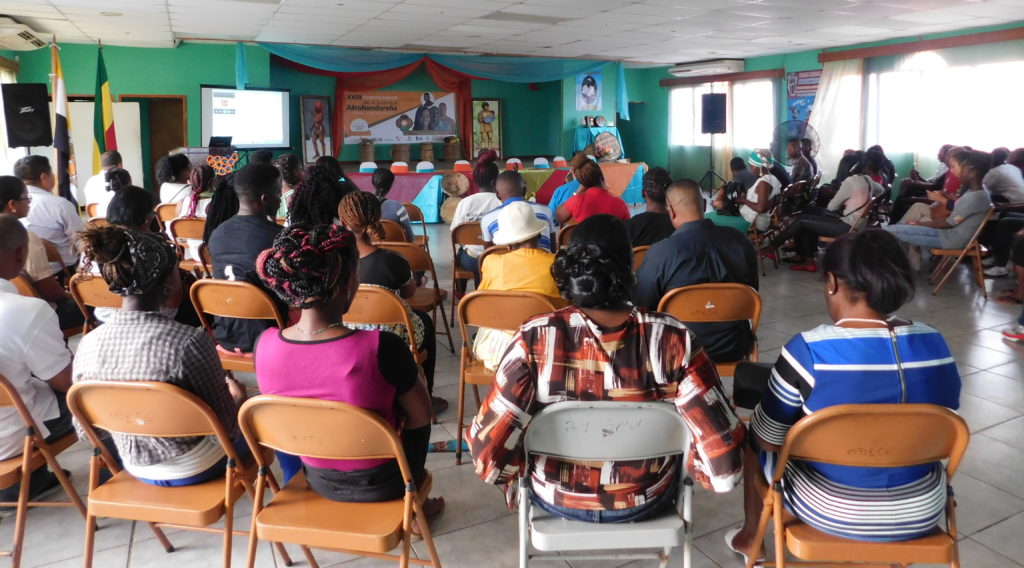
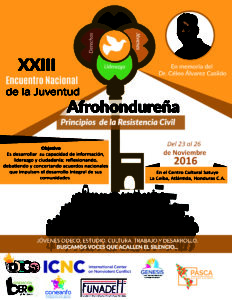
Training civil society leaders in Côte d’Ivoire
Oui aux Actions Non-violentes en Côte d’Ivoire
Ahouty Kouakou, ICNC-SI 2016, LIN 2016
Ahouty’s project titled “Yes to nonviolent actions in Côte d’Ivoire” brought together 32 trainees from Associations, youth-led organizations, NGOs, student federations, disability groups, and faith-based organizations in Abidjan, Côte d’Ivoire. The aim of the project
was to train civil society leaders on the concepts of civil resistance and nonviolent action, who would in turn replicate the initiative and train others. Tools and strategies were shared with local organizations and a network of trained professionals were created.
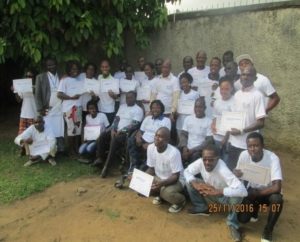
Participants received manuals, t-shirts, and certificates at the end of the program. Ahouty held a press conference at the end of the workshop which appeared in at least one local newspaper, as well as two meetings with local authorities and NGO representatives to explore future collaboration on nonviolent action. Ahouty estimates that the training indirectly benefited 320 people. A workshop program and curriculum were also developed in
French.
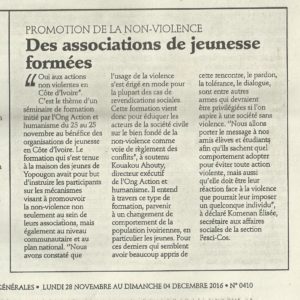
Community-led resistance in Zimbabwe
Community-led resistance against destructive mining practices in Penhalonga, Zimbabwe
Farai Maguwu, ICNC-SI 2016, LIN 2016
One three-day workshop was held for 40 citizens of Penhalonga, Zimbabwe in response to increasing violence and repression by mining companies and the government. Mining corporations have long been causing harm to the environment with destructive mining practices, while reaping profits from a resource-rich land. Mining projects have caused detrimental changes in the environment, economy and society at large, causing the loss of livelihoods for local farmers, ranchers, fishermen and artisanal miners. Knowledge gained from this workshop is expected to influence similar resistance movements across the country.
Eight participants were identified from this group of 40 to form a leadership committee for planning further activism, and they participated in an additional movement-planning workshop. Subsequently, a smaller leadership team of three activists met over 30 times to plan nonviolent action in response to mining abuses in Penhalonga.
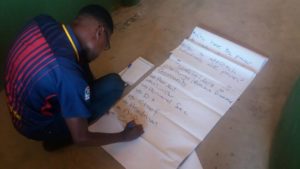 The training was held under the auspices of the Centre for Natural Resource Governance, an advocacy group that works to strengthen the capacities of communities to resist destructive mining.
The training was held under the auspices of the Centre for Natural Resource Governance, an advocacy group that works to strengthen the capacities of communities to resist destructive mining.
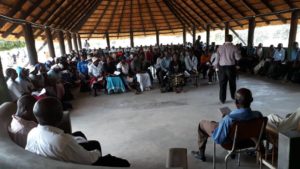
Kenyans for Tax Justice Movement
Julius Okoth Ooko, ICNC-SI 2016, LIN 2016
Julius’ project had the objective of working with communities and interested parties to oppose the Value Added Tax (VAT) that was imposed on Kenya’s school text books, a move which has hit impoverished families.
The project sought to work with communities to ensure that these new taxes are abolished, and education is made accessible to all using nonviolent means of resistance. In the project’s first phase, one three-day capacity-building training of trainers was held for 20 core activists in the Kenyans for Tax Justice movement. Subsequently, these activists each held community forums around the country, transmitting knowledge of nonviolent resistance to roughly 800 people. Julius estimates that a further 1600 people benefited indirectly from these community forums through personal relationship with those who participated. A training curriculum and associated presentations were developed.
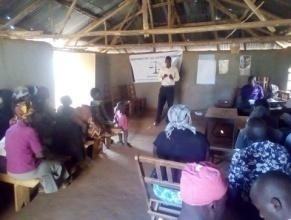
Nonviolent Actions in Madagascar
Learning Initiative Aiming at Nonviolent Actions (LIANA), Madagascar
Ketakandriana Rafitoson, ICNC-SI 2016, LIN 2016
Ketakandriana’s project goals were to raise the Malagasy people’s awareness about nonviolent civil resistance and to show that this form of resistance is possible and impactful. The project also aimed to develop training tools and materials about civil resistance in Malagasy language.
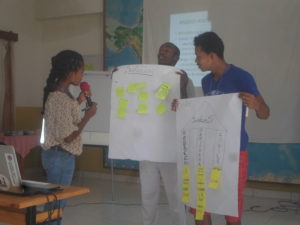
The project activities served 330 people in three regions of Madagascar: Analamanga (Antananarivo), Vakinankaratra (Antsirabe), and Menabe (Morondava). Three two-day workshops were held for a total of 160 urban and rural Malagasy citizens (70 women, 90 men), and three half-day workshops based on a film screening were held for another 170 people (106 women, 68 men). In addition, 29 people affiliated with partner NGOs (Liberty 32 and Wake Up Madagascar) were trained and helped staff the project. A radio program on civil resistance was broadcast on November 25, 2016, and Ketakandriana estimates that this program reached at least 220 people across the country. Several training materials were developed in Malagasy, including a 15-minute documentary film on civil resistance, a passport booklet on civil resistance for beginners, and civil resistance manual for activists. Additional training materials were translated into Malagasy. Ketakandriana estimates a total project reach—direct and indirect—of 1,173 people across different demographics.
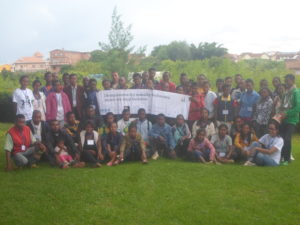
Learning Initiative in Uganda
Daniel Tulibagenyi and Phil Wilmot (Solidarity Uganda), ICNC-SI 2016, LIN 2016
The goals of this project were to conduct curriculum writing, training, and follow-up activities on nonviolent action and civil resistance strategies with selected activists and organizers in Uganda.
Two workshops providing knowledge and skills of nonviolent action—one five-day and one four-day—were conducted for 27 Ugandan activists (16 women, 11 men – 80%+ of participants from poor backgrounds) in Kampala and Lira, Uganda. Radio talk shows were developed and disseminated by one of the workshop trainees (with thousands reached), and several trainees from the first workshop assisted at the second workshop. A WhatsApp group among trainees was formed to support each other in their campaigns. And, trainees are adapting the curriculum to new contexts, such as a high school training on weekends.
Solidarity Uganda estimates that of the 27 participants, at least 20 are able to replicate the trainings in their own constituencies. The more activist-minded participants immediately implemented their new skills and have reached an estimated 300 people, based on pictures and the information they have shared on WhatsApp. Trainees have coordinated multiple campaigns such as organizing against land grabs, poor infrastructure, erosion of schools, and police brutality, as well as training for women and high school and university students. One participant from the Eastern District of Uganda immediately applied the knowledge he gained from the training to shut down the border and tax authority office with some comrades and repealed a regressive tax on small farmers exporting to Kenya.
2015 LIN Projects
Civil Resistance Training in Burkina Faso
Workshop on nonviolent conflict and civil resistance for leaders of associations and NGOs of Burkina Faso
Yves Boukari Traore, ICNC-SI 2015, LIN 2015
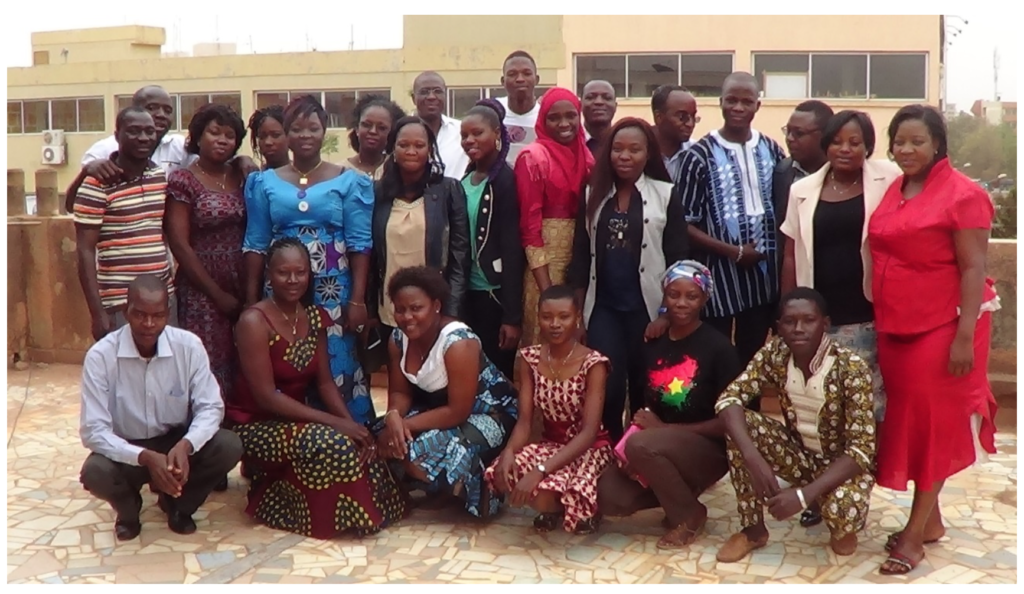
One workshop was conducted for 30 activists in Burkina Faso, all of them leaders of Associations, NGOs and Community Based Organizations in the country. The project’s goal was to contribute to the capacity building of these active associations, NGOs, and independent social and professional entities from the four bigger cities of the country that were at the front lines during the social and political unrests Burkina Faso experienced recently. These leaders led peaceful and remarkable nonviolent actions during the 2014 uprisings and the 2015 coup attempt that led to the departure of the country’s dictator. As part of the LIN project, a 4-day workshop was implemented to train these organizations’ leaders to better mobilize their members and think more strategically while empowering them with nonviolent civil resistance concepts and practical knowledge and tools. These same leaders succeeded in mobilizing a large number of people for a memorable civil resistance action that stopped another coup attempt by the dictator’s former chief of staff and high-ranking military officer.
Two short videos (one in English and one in French) were produced and broadcast in local media about civil resistance. Materials and flyers were translated into French and four local languages (Mooré, Dioula, Gulmanchema and Fulani).
Yves Boukari Traore is the Amnesty International National Director and his workshops and activities helped connect human rights initiatives with civil resistance in Burkina Faso.
Shifting Brazil’s People’s Power to Act
Nonviolent Training for a Sustainable World
Maíra Irigaray, FSI 2015, LIN 2015
Maira’s project aimed to empower social and indigenous movements in the Brazilian Amazon by providing easy to implement tactical tools for more sustainable strategies. A series of training videos about nonviolent resistance were produced and showcased during and after a workshop which was held in the Amazon in February of 2016. Besides empowering local Amazonian movements, the initiative also led to the creation of a series of short workshops held at the Federal University of Mato Grosso (UFMT) taught by a law professor using the material created during the LIN project.
An Initiative for Change: Capacity building of youth, religion and political party leaders on local civil nonviolent movement in Pakistan
Imran Khan, Human Rights Alliance (HRA) Pakistan – ICNC-SI 2012, LIN 2015
Imran Khan’s project aimed to train youth, political parties and religious leaders in Sindh province, Pakistan on concepts, strategies and tactics of civil resistance and nonviolent action in a place where nonviolent movements frequently turn into violent ones. The ultimate outcome of the project was to prepare and enhance the capacities of key civil resistance leaders to achieve better and sustainable results. The project also created a nonviolent action leaders club and resource center.
16 workshops, including a Train the Trainer, were provided to 425 participants in different cities in Sindh province. These participants included members of active political parties, youth leaders from leading universities in Sindh, and religious groups with a strong presence in the local communities. Translations were compiled into a manual in Sindh, and a Rickshaw campaign was developed using translated key messages.
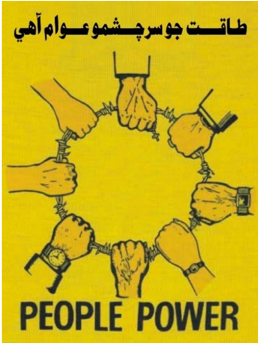
Civil Resistance Seminar for University Students in Local Language, Kyrgyzstan
Bakytbek Tokubek Uulu, FSI 2012, LIN 2015
The main objective of this initiative was to equip students with basic knowledge and practice of nonviolent conflict and peace terminologies. Six seminars were conducted at Issyk-Kul State University in Karakol city from February to March 2016. Up to thirty students – mainly from villages around Karakol city- participated in the trainings. During the seminar, students practiced their knowledge and skills on civil resistance through role play and theater performance exercises. Civil resistance topics and theories were new to students and it was very interesting topic to explore in their native language.
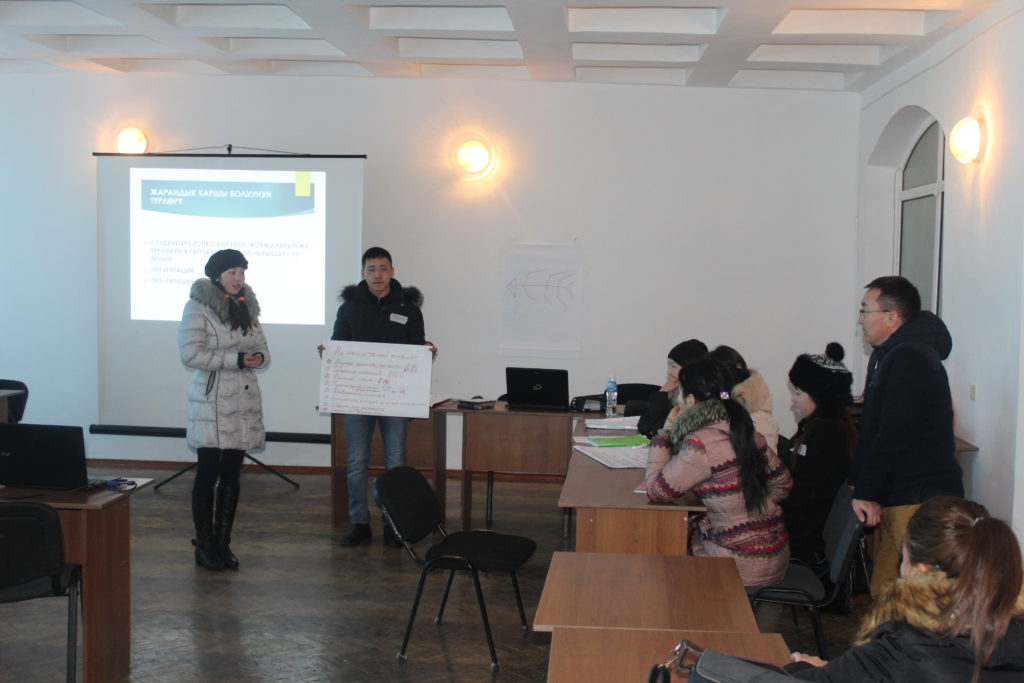
Marketplace activism in rural Cameroon
Bergeline Domou and Edna Njilin, Cameroon O’Bosso, ICNC-SI 2015, LIN 2015
The overall goal of this project was to build the knowledge and capacity of women in marketplaces in Cameroon in their mission to improve their basic human rights and their working conditions. Five activities were implemented that include: three workshops on civil resistance and nonviolent action conducted in very rural areas with grassroots marketplace women activists; one national training to unite and network the marketplace women from around the country and develop a national strategy and plan of action; and one evaluation and feedback meeting. In addition, the women had created theater and presentations for other illiterate women organizing for basic human and labor rights.
Campaigns include advocacy for better working conditions (clean markets, water, and infrastructure), advocacy for the payment of legal and just taxes, security of goods and people in the marketplace, and participation of traders in the management and decision-making process in the marketplace.
A total of 93 people were in attendance at these events. An estimated wider audience of about 5000 were reached due to flyer distribution and awareness raising campaigns in 5 local markets.
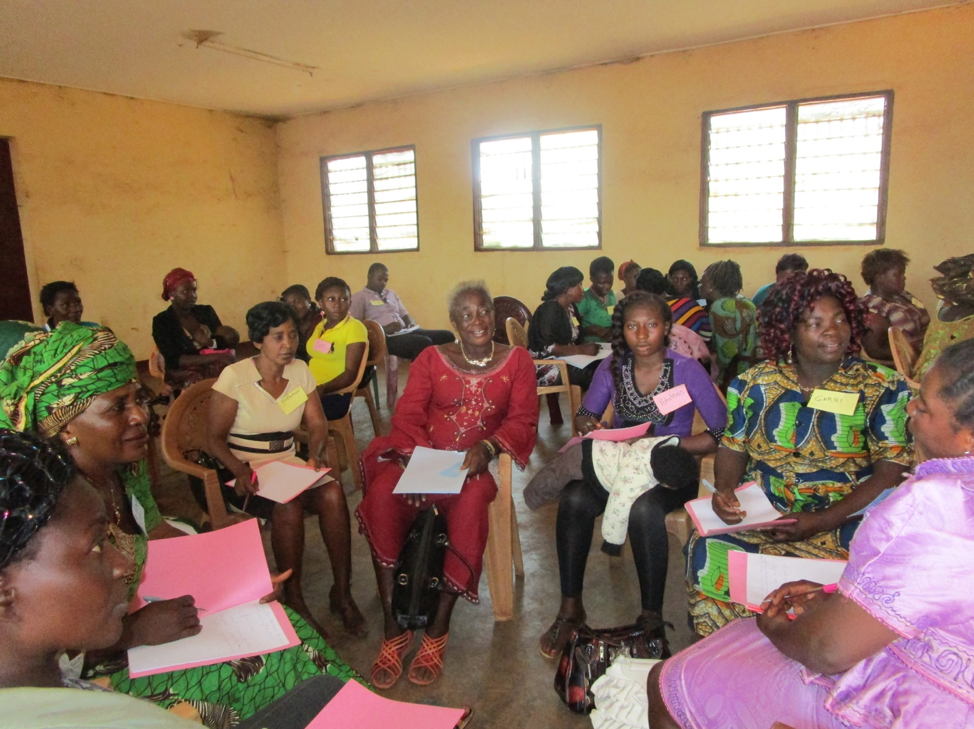
2014 LIN Projects
Introducing Nonviolent Civic Mobilization in Kunar, Afghanistan
Archiwal Ahmadullah, President of the Organization for Social, Cultural, Awareness and Rehabilitation (OSCAR), LIN 2014
Archiwal’s project aimed to introduce concepts of nonviolent struggle in Asadabad, the capital of Kunar province, one of the most volatile provinces of Afghanistan. Activities included the development of a manual on nonviolent civic mobilization in Pashto and a four day introductory workshop for over thirty students, religious scholars and tribal chiefs. Each participant committed to sharing the knowledge they gained with their communities in the weeks following the event.
The workshop was held under the auspices of OSCAR, an organization pioneering the translation and dissemination of knowledge on civil resistance in Afghanistan.
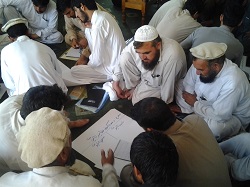
Theory, Power and Practice of Active Nonviolence in South Africa
Shireen Mukadam, Independent Journalist and Writer, FSI 2013, LIN 2014
In partnership with the local nonprofit Embrace Dignity and the Goededacht Forum, Shireen organized a three-day workshop on Active Nonviolence in Cape Town, South Africa in November 2014. Thirty activists working on a diverse range of human rights and social justice issues attended, including from the “Right to Know” campaign and service delivery campaigns. In addition to the workshop, Shireen compiled a comprehensive workbook with resources on strategic nonviolent action, including translations of key civil resistance resources into Xhosa.
The workshop has since led to several other initiatives, including film screenings of the A Force More Powerful documentary, which features a segment on the anti-apartheid boycott, and as well as discussions.
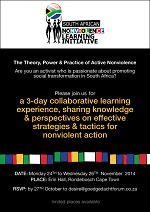
Mobilizing University Students to Choose Nonviolent Action in Cameroon
Gabi Laurent, RECAAD, Cameroon, FSI 2013, LIN 2014
University student leaders representing five state universities joined together for this introductory workshop on the theory, practice and global history of nonviolent struggle. The workshop also provided space for student leaders, who often work in isolation, to connect with one another, share their experiences and develop a network that would foster future collaboration and coordination of activities across universities. Upon returning to their universities, these student leaders distributed posters and stickers designed to educate students about nonviolent action, while also carrying out awareness-raising campaigns and discussions about nonviolent action on campus.
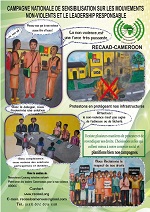
Using Mobile Technology to Educate Students to Maintain Nonviolent Discipline
Stephen Asek, FSI 2013, LIN 2014
Stephen’s project aimed to enlist the participation and support of the Vice Chancellor at the University of Buea in developing nonviolent action related curriculum, teaching and training. Upon exposure to the topic through educational videos, the Vice Chancellor accepted to fund a two-day training on nonviolent discipline for student leaders on March 26 and 27, 2015. The initiative also led to a new club about nonviolent action.
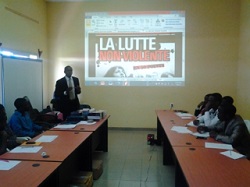
Educating & Supporting Local Activists to Use Nonviolent Action in Vanuatu
Sarah Doyle, Further Arts & Youth Against Corruption, Vanuatu, FSI 2014, LIN 2014
In 2014, Sarah initiated a new training program introducing the concept of nonviolent conflict to youth and community activists in Vanuatu. Through building a network of activists in Vanuatu, and linking with activists in Solomon Islands, Papua New Guinea and West Papua, the program provided the tools and resources to people at the grassroots level to successfully use nonviolent action to tackle systems of oppression and corruption that plague their communities. This program aimed to demystify nonviolent conflict in a way that is easily understood and relatable to the Melanesian context using pidgin English.
The program included a 7-day workshop lead by local trainers from Further Arts and Youth Against Corruption Vanuatu, followed by a 1-day seminar inviting the wider public and other civil society groups to participate in and exchange with each other. With a number of new ideas, tools, and exercises to test out, participants of the program are now grappling with the more difficult task of transferring civil resistance methods to their work and communities. In the coming months, a handbook will be printed and distributed to community activists in the program’s network, and follow up activities will be organized to continue strengthening the network and understanding of nonviolent conflict and nonviolent action in Melanesia.

